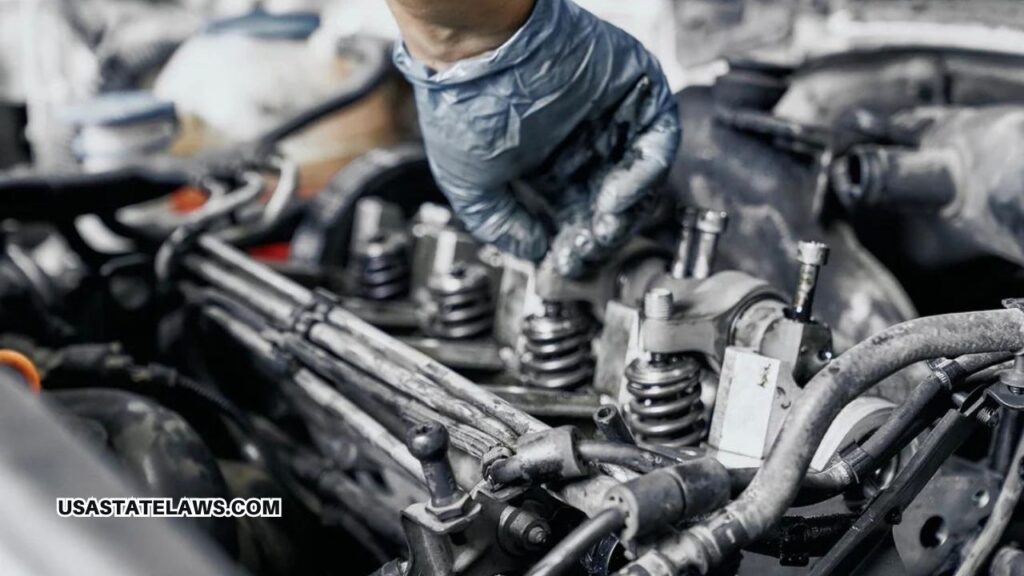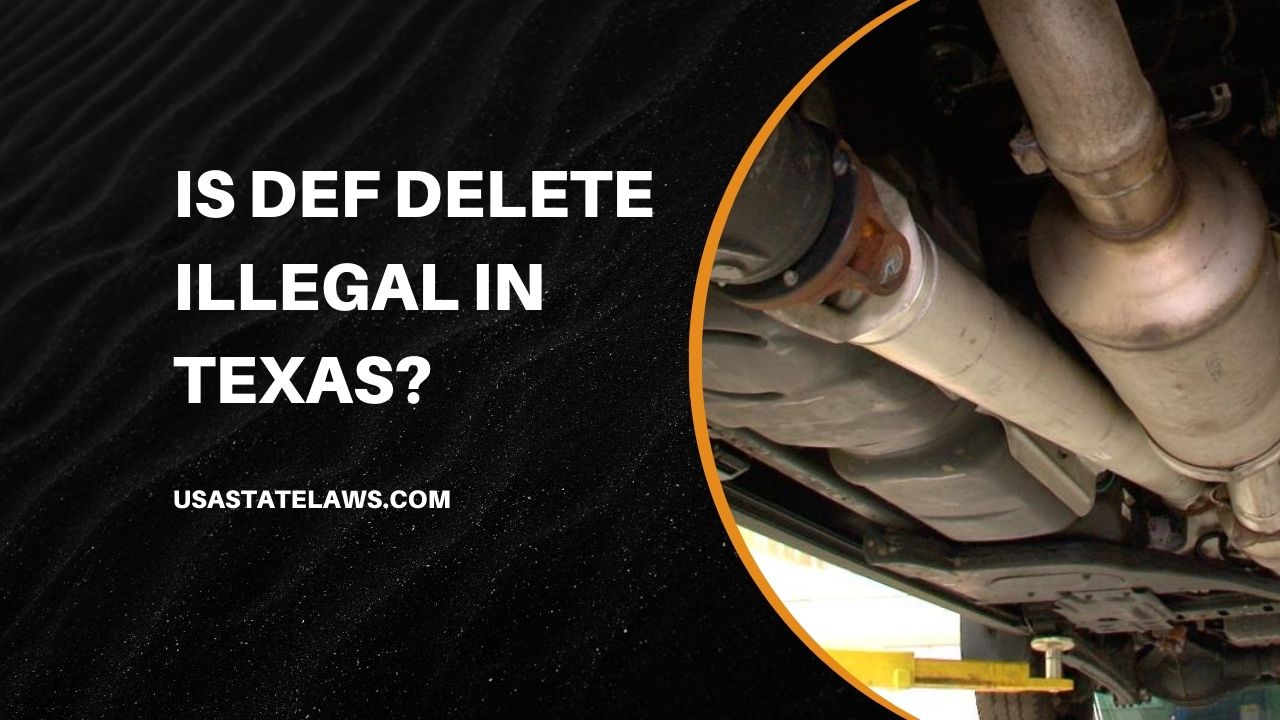Is Def Delete Illegal In Texas? There is no specific law in Texas that explicitly mentions “Def Delete” as illegal.
In recent years, the discussion surrounding DEF (Diesel Exhaust Fluid) Delete has gained traction among diesel vehicle owners.
While some argue that deleting the DEF system improves engine performance and reduces maintenance costs, the legal implications are often overlooked.
Understanding the legal status of DEF Delete in Texas is crucial for vehicle owners who want to avoid hefty fines, legal complications, and environmental consequences.
In this article, we delve into what DEF Delete is, the relevant laws in Texas, potential penalties, environmental impacts, and legal alternatives for enhancing diesel vehicle performance.
Contents
What is DEF Delete?
Definition of DEF Delete
DEF Delete involves the removal or bypassing of the Diesel Exhaust Fluid system, a critical component in modern diesel engines designed to reduce harmful nitrogen oxide (NOx) emissions.
The DEF system works by injecting a urea-based fluid into the vehicle’s exhaust stream, converting NOx into harmless nitrogen and water vapor.
By eliminating the DEF system, a vehicle no longer adheres to emissions standards, resulting in increased emissions output.
Purpose of DEF Delete
The primary motivations for DEF Delete are related to perceived improvements in engine performance, fuel economy, and lower maintenance costs.
Some diesel owners believe that the DEF system restricts engine performance and efficiency. [Is Def Delete Illegal In Texas?]
By deleting the system, they claim to achieve more power, better throttle response, and reduced need for DEF fluid refills, which can be costly over time.
Impact on Vehicles
While the perceived benefits of DEF Delete may appeal to some, there are significant downsides to consider. [Is Def Delete Illegal In Texas?]
Removing the DEF system can lead to a series of issues, including damage to the engine control module (ECM) and other vital components. Moreover, DEF Delete may void the vehicle’s warranty, leaving the owner responsible for costly repairs.
It is important to recognize that DEF systems are designed to optimize engine performance while reducing harmful emissions—tampering with them can lead to more harm than good in the long term.

Legal Framework in Texas
Texas State Laws on Vehicle Emissions
Texas has stringent laws governing vehicle emissions to ensure air quality and protect public health. The Texas Commission on Environmental Quality (TCEQ) is the primary agency responsible for regulating and enforcing these laws.
According to the Texas Clean Air Act, tampering with or removing emissions control devices is illegal. Since DEF Delete directly impacts a vehicle’s emissions control system, it falls under this category of illegal activities.
Federal Laws and Emissions Standards
The Clean Air Act is a federal law that sets nationwide standards for vehicle emissions, including NOx emissions from diesel engines. Under this act, tampering with emissions control systems, including DEF Delete, is illegal across the United States.
The Environmental Protection Agency (EPA) has been cracking down on businesses and individuals who engage in emissions tampering, including those involved in DEF Deletes. [Is Def Delete Illegal In Texas?]
In Texas, these federal regulations are enforced alongside state laws, creating a comprehensive legal framework that prohibits DEF Delete.
Penalties for Violating Emission Laws
Violating emissions laws in Texas can lead to severe financial penalties. The fines for DEF Delete can range from $500 to $10,000, depending on the circumstances and whether it is a repeat offense.
Additionally, businesses that offer DEF Delete services can face even harsher penalties, including potential shutdowns and criminal charges.
Repeat offenders may face escalating fines and more serious legal consequences, including possible imprisonment. [Is Def Delete Illegal In Texas?]
Is DEF Delete Illegal in Texas?
Current Legal Status
Although Texas law does not explicitly mention “DEF Delete,” the act of tampering with a vehicle’s emissions control system is considered illegal. This means that DEF Delete is indirectly covered under broader tampering laws.
The Texas Administrative Code defines “tampering” as any modification, removal, or bypassing of an emissions control device or element of design installed on a motor vehicle.
As DEF Delete involves removing or bypassing the DEF system, it qualifies as illegal tampering under this code.
Interpretation of Emission Tampering Laws
The interpretation of tampering laws in Texas and at the federal level is broad and encompasses various forms of emissions system modifications.
Authorities have clarified that any modification that diminishes the effectiveness of a vehicle’s emissions control system, including DEF Delete, is prohibited.
This interpretation ensures that all forms of tampering, whether explicitly mentioned or not, are covered under existing laws. [Is Def Delete Illegal In Texas?]
Case Studies and Legal Precedents
There have been multiple cases where vehicle owners and businesses in Texas faced legal action for DEF Delete modifications.
For example, in 2023, a well-known diesel performance shop in Texas was fined $75,000 and ordered to cease operations after being found guilty of performing DEF Deletes on multiple vehicles.
Such cases serve as cautionary tales, emphasizing the risks and legal repercussions associated with emissions tampering.
Consequences of DEF Delete
Environmental Impact
Deleting the DEF system significantly increases a vehicle’s NOx emissions, contributing to poor air quality and health problems.
NOx is a major pollutant that causes respiratory issues, smog formation, and acid rain. Texas, particularly in metropolitan areas like Houston and Dallas, already faces challenges with air pollution.
Vehicles with deleted DEF systems exacerbate these issues, impacting the environment and public health. [Is Def Delete Illegal In Texas?]
Impact on Vehicle Warranty
Most vehicle manufacturers clearly state that tampering with emissions control systems will void any existing warranties.
This means that any repairs or maintenance that would have been covered under warranty must be paid for out of pocket by the vehicle owner.
This can lead to thousands of dollars in costs, especially if the DEF Delete causes damage to other engine components.
Financial Penalties and Fines
Beyond environmental and warranty implications, DEF Delete can result in substantial fines. [Is Def Delete Illegal In Texas?]
The penalties for emissions tampering are not just financial; vehicle owners may also be required to restore the emissions control systems to comply with regulations, which can be costly and time-consuming.
Businesses found guilty of performing DEF Deletes face even harsher penalties, such as significant fines, loss of business licenses, and potential lawsuits.
Legal Liability and Criminal Charges
In severe cases, individuals and businesses may face criminal charges for violating emissions laws. Repeat offenders and those found to be willfully non-compliant with federal and state regulations may be prosecuted and face jail time.
Legal liabilities extend beyond fines and criminal charges, including potential lawsuits from affected parties who may claim health impacts due to increased emissions.
Alternatives to DEF Delete
Legal Performance Enhancements
There are several legal ways to enhance diesel engine performance without resorting to illegal modifications like DEF Delete. [Is Def Delete Illegal In Texas?]
Options such as high-flow air filters, cold air intakes, and emissions-compliant performance tuners are available that provide increased power and efficiency without compromising emissions compliance.
These modifications are designed to work within the framework of federal and state laws, ensuring that vehicle owners can enjoy enhanced performance without legal risks.
Maintaining DEF Systems
Proper maintenance of the DEF system ensures that it continues to operate effectively, reducing NOx emissions while maintaining optimal engine performance.
Regularly checking and refilling the DEF tank, replacing worn-out components, and conducting routine inspections can prevent malfunctions and extend the life of the emissions control system.
Maintaining a well-functioning DEF system is not only environmentally responsible but also helps avoid potential fines and penalties.
Retrofitting and Upgrading Options
For older diesel vehicles that may not meet current emissions standards, retrofitting with modern emissions control technologies is a viable option.
Retrofitting can include installing new catalytic converters, diesel particulate filters, or updated DEF systems that meet current regulations.
In some cases, these upgrades may qualify for state or federal incentives, reducing the overall cost for the vehicle owner.
Final Verdict
Based on current laws in Texas and federal regulations, DEF Delete is illegal and considered a form of emissions tampering.
The short-term gains of increased performance or cost savings do not outweigh the potential legal consequences, financial penalties, environmental harm, and impact on vehicle warranties.
Vehicle owners are strongly encouraged to explore legal alternatives to improve performance and adhere to emissions standards to avoid significant legal and financial repercussions. [Is Def Delete Illegal In Texas?]
See Also: Are Squatted Trucks Illegal In Texas?
FAQs
What is the fine for DEF Delete in Texas?
The fine for DEF Delete in Texas can range from $500 to $10,000, depending on the severity of the violation and whether it is a repeat offense. Businesses can face even higher fines and legal consequences.
Can you reverse a DEF Delete?
Yes, a DEF Delete can be reversed, but it often involves substantial costs to restore the DEF system and other components to their original state. Reversing a DEF Delete also helps in regaining compliance with emissions laws.
Are there any legal modifications to enhance diesel engine performance?
Yes, legal modifications such as high-flow air filters, cold air intakes, and emissions-compliant performance tuners can improve performance without violating emissions laws.
Does DEF Delete affect my vehicle’s resale value?
Yes, DEF Delete can negatively affect a vehicle’s resale value because it voids warranties and makes the vehicle non-compliant with emissions standards. Potential buyers may also be wary of purchasing a vehicle with tampered emissions systems.
How can I report a vehicle with a DEF Delete in Texas?
You can report vehicles suspected of emissions tampering, including DEF Delete, to the Texas Commission on Environmental Quality (TCEQ). Reports can be made anonymously to ensure compliance and help protect air quality.
Conclusion: Is Def Delete Illegal In Texas?
While DEF Delete may seem like an attractive option for diesel vehicle owners looking for performance boosts or cost savings, it is illegal in Texas due to its classification as emissions tampering.
Both state and federal laws strictly prohibit modifications that impair a vehicle’s emissions control system, and the consequences of non-compliance are severe.
Vehicle owners should prioritize staying compliant with emissions regulations and explore alternative, legal methods to enhance their vehicle’s performance.
By maintaining the DEF system and considering legal performance enhancements, vehicle owners can enjoy a balance of power, efficiency, and environmental responsibility without risking legal trouble or substantial financial penalties.

Hello guys, I’m Trey Simpson from Los Angeles. After completing my J.D., I noticed a lack of clear information online about laws in different U.S. states. So, I created this blog to help. Now, I’m a lawyer and continue blogging. Thanks for visiting!

